Presentations
Florian Busch (University of Bern)
Tying together the Total Linguistic Fact: Multi-method approaches to smartphone-based interactions
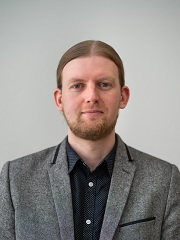 Florian Busch is assistant professor at the Institute of German Studies at the University of Bern. His research interests include interactional sociolinguistics, grapholinguistics, digital communication as well as metapragmatics and language ideologies. He co-edited a special issue on "The Sociolinguistics of Exclusion" in Language & Communication and published a book on adolescents' digital writing. He is the Principal Investigator of the SNSF-funded research project "Texting in Time", exploring the temporalities of smartphone-based interactions in the mediatized lives of European societies.
Florian Busch is assistant professor at the Institute of German Studies at the University of Bern. His research interests include interactional sociolinguistics, grapholinguistics, digital communication as well as metapragmatics and language ideologies. He co-edited a special issue on "The Sociolinguistics of Exclusion" in Language & Communication and published a book on adolescents' digital writing. He is the Principal Investigator of the SNSF-funded research project "Texting in Time", exploring the temporalities of smartphone-based interactions in the mediatized lives of European societies.
Abstract
The paper sheds light on the methodological settings of two research projects that deal with everyday smartphone-based interactions, both of which use multi-method approaches. Both study designs are theoretically based on the comprehensive concept of the Total Linguistic Fact (Silverstein 1985) and investigate the interweaving of semiotic structures, communicative practices, and cultural ideologies in and around digitally mediated interactions. The first exemplary project examines written variation intexting among German adolescents and uses a multi-level framework of frequentative variation analyses, interactional sequence analyses, and interviews to identify socio-indexical registers that shape the digital literacies of the populationstudied (Busch 2021). The second exemplary project investigates temporalities and rhythms in everyday smartphone communication in Germany and Switzerland, based on screen capturing data and interviews. Drawing on a pilot study, the paper outlines the workflows of data collection and data preparation that are required for this relatively unexplored type of data and discusses the ethical, practical, and analytical challenges that arise. Additionally, the presentation addresses which research questions can be answered using screen capturing data, where static log files or screenshots might be not sufficient. In view of these two studies, the paper advocates for multi-method approaches and multi-layered datasets to trace the complexities of smartphone-based communication through the lens of a TLF-oriented linguistics.
Busch, Florian (2021): Digitale Schreibregister. Kontexte, Formen und metapragmatische Reflexionen.Berlin, Boston: De Gruyter. https://doi.org/10.1515/9783110728835
Silverstein, Michael (1985): Language and the culture of gender. At the intersection of structure,usage, and ideology. In: Mertz, Elizabeth; Parmentier, Richard J. (eds.). Semiotic mediation. Orlando: Academic. 219–239.
Kristin Vold Lexander (Inland University Norway)
Mediagrams in the study of digital workplace interaction, home-school communication, and inclusion
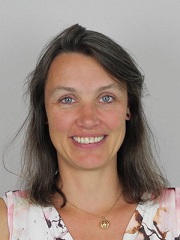
Kristin Vold Lexander is a researcher at Inland Norway University of Applied Sciences and leads the project Digital interaction and multilingualism at work and in school: The case of Lithuanians in rural Eastern Norway (DigiMulti), funded by the Research Council of Norway 2020-2024. Her research focuses on multilingualism in digital interpersonal interaction in different contexts: among youth, in the family, at the workplace. Her recent publications appear in Journal of Sociolinguistics, Journal of Multilingual and Multicultural Development, and Language and Communication. Together with Jannis Androutsopoulos, she has written Multilingual Families in a Digital Age (Routledge).
Abstract
How do language practices in digital interaction at work and in the dialogue between parents and teachers affect work migrants’ experiences of inclusion and exclusion in the online/offline nexus? This question guides the research that this paper reports from, carried out with migrant workers and parents and their interlocutors (Thyness and Lexander 2023). The paper first focuses on the methodological challenge of collecting and analyzing data on online interaction to understand processes of inclusion, encompassing on- and offline practices. It thus draws on recent discussions of methodological implications of the increasingly blurred online/offline distinction (e.g. Bolander and Locher 2020). Second, with reference to work on the use of visual tools for researching linguistic repertoires (Busch 2016), it analyzes the use of mediagrams. Mediagrams are collaborative visualizations of the digital, linguistic and modal resources that participants mobilize in interaction with various interlocutors (Lexander and Androutsopoulos 2021), and in the project, participants came to use them in different ways that will be discussed here, for instance to narrate migrant trajectories with digital interaction as the starting point. Furthermore, mediagrams were brought into the classroom, in collaboration with teachers who wanted to use them to enhance their communication with migrant parents, leading to further methodological reflection.
Bolander, B., & Locher, M. (2020). Beyond the online offline distinction: Entry points to digital discourse. Discourse, Context & Media, 35. https://doi.org/10.1016/j.dcm.2020.100383
Busch, B. (2016). Biographical approaches to research in multilingual settings: Exploring linguistic repertoires. In Martin-Jones, M. and D. Martin (eds.) Researching Multilingualism: Critical and Ethnographic Perspectives (pp. 46-59). London, Routledge.
Lexander, K., & Androutsopoulos, J. (2021). Working with mediagrams: A methodology for collaborative research on mediational repertoires in multilingual families. Journal of Multilingual and Multicultural Development, 42(1), 1-18. https://doi.org/10.1080/01434632.2019.1667363
Thyness, H., & Lexander, K. (2023). Indexing the ‘included’ migrant? Social categorization and interpersonal digital interaction between labor migrants, teachers and employers in Norway. Language & Communication, 88, 27-40.
Agnieszka Lyons & Caroline Tagg (Queen Mary University of London & Open University, UK)
Post-digital linguistic ethnography: A day-in-the-life approach to understanding contemporary communication
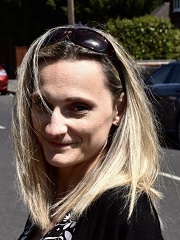 Agnieszka Lyons is Reader in Applied Linguistics and Multimodality at Queen Mary University of London. Her research employs multimodal and mediated discourse analytic as well as ethnographic approaches to explore the discursive construction of embodied identity in polycentric migrant environments. She has published on issues related to migration and mobility in Language in Society, Journal of Pragmatics and Social Semiotics, among others. With Caroline Tagg, she authored Mobile Messaging and Resourcefulness: a post-digital ethnography (2022).
Agnieszka Lyons is Reader in Applied Linguistics and Multimodality at Queen Mary University of London. Her research employs multimodal and mediated discourse analytic as well as ethnographic approaches to explore the discursive construction of embodied identity in polycentric migrant environments. She has published on issues related to migration and mobility in Language in Society, Journal of Pragmatics and Social Semiotics, among others. With Caroline Tagg, she authored Mobile Messaging and Resourcefulness: a post-digital ethnography (2022).
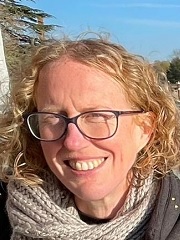
Caroline Tagg is Senior Lecturer in Applied Linguistics at The Open University, UK. Her research into language and digital technologies rests on the understanding that digital communication practices are deeply embedded into individuals’ wider lives. She is author of Taking Offence on Social Media (with Philip Seargeant and Amy Aisha Brown, 2017), Message and Medium (with Mel Evans, 2020) and Mobile Messaging and Resourcefulness: a post-digital ethnography (with Agnieszka Lyons, 2022). She is co-editor of the Routledge Focus series Language and Social Media (with Sirpa Leppänen) and editor-in-chief of the international journal Discourse, Context & Media.
Abstract
The post-digital recognises that the digital has ceased to be a salient or disruptive element of society, but permeates everyday life just as everyday life permeates digital technologies. This mutual influence calls for a shift in scholarly approaches to digital communication, with the digital forming part of a broader analysis of communicative behaviours of people within their social environments.
Our post-digital linguistic ethnography adopts a new approach to the management and analysis of heterogenous datasets which we call a day-in-the-life approach. We focus on the totality of exchanges in which a networked individual engages over a 24-hour period and contextualise these exchanges within their offline social (dis)engagements. This approach foregrounds the ways in which individuals move between multiple interweaving conversational encounters across offline and online sites, demonstrating how digital interactions both shape and are shaped by the (shifting) physical contexts in which they take place and how they aid interactants’ extra-digital aims. Drawing on findings from two projects, Translation and Translanguaging (TLANG, 2014-2018) and Mobile Conversations in Context (MoCo, 2021-2022), we show how contemporary communication is shaped by people’s shifting attention and by their attempts to assert control over their communicative practices as they manage online conversations in the context of in-person encounters and commitments.
Catherine Tebaldi (University of Luxembourg)
Reflecting on fascism: Critical reflexivity as a method for exploringthe offline/online nexus in a study of white male supremacism
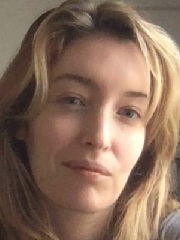 Catherine Tebaldi is a linguist anthropologist at the University of Luxembourg. Her current research looks at white nationalist women’s language; how white nationalists use the conventions of women’s language to make hate sexy- to naturalize, circulate, and advertise ethnonationalism.
Catherine Tebaldi is a linguist anthropologist at the University of Luxembourg. Her current research looks at white nationalist women’s language; how white nationalists use the conventions of women’s language to make hate sexy- to naturalize, circulate, and advertise ethnonationalism.
Previously, with Dr. Katie Gaddini at University College London, she developed a blended approach to study of far-right youth politics. She obtained her PhD, on far right cultural politics, from UMass Amherst, from 2022 while publishing 10 articles in journals like Social Anthropology, International Journal of the Sociology of Language, as well as blogs and news articles. Her latest is a special issue in Gender and Language, with Dominika Baran, on Gender and Nationalism.
Abstract
Drawing on her own research on the far right, Catherine will speak about critical feminist approaches to blended ethnography, specifically the importance of critical reflexivity at each step -- from design, to analysis, to representation. The talk will begin by defining critical approaches to reflexivity as “anti-biography” (Bourdieu & Wacquant 1992) as both an ethical approach to research, and a way to shed light on broader processes of social inequality, language and power. It will then illustrate three applications of reflexivity at different moments of research: design, analysis, and representation: first, as a research design principle, the talk will outline the reflexive methods for social media analysis she developed in her PhD. Second, as an analytic principle, the talk will share excerpts from digital field notes where this media was analyzed, to show how this reflexivity illuminates questions of normalization, circulation and uptake. Third, the talk will discuss writing and importance of reflexivity in representation. Finally the talk will return to the ethical and political implications of this analysis: after all the study of the online and offline nexus is interesting, but what really matters (to me) is to find out how Nazis, male supremacists, or white nationalists are getting across it.
Bourdieu, Pierre, and Loïc JD Wacquant. An invitation to reflexive sociology. University of Chicago press, 1992.
Camilla Vasquez (University of South Florida)
Discussion: Methodological innovations, quandaries, and directions forward
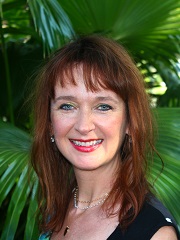 Camilla Vásquez is Professor of Applied Linguistics in the Department of World Languages at the University of South Florida, where she directs the Linguistics and Applied Language Studies (LALS) doctoral program. She is the author of The Discourse of Online Consumer Reviews (Bloomsbury, 2014) and Language, Creativity and Humour Online (Routledge, 2019). Her most recent book is the edited volume, Research Methods for Digital Discourse Analysis (Bloomsbury, 2022). Camilla’s research on digital business communication, online identities, and linguistic creativity has been published in venues such as Current Issues in Tourism, Discourse Context & Media, Food & Foodways, Intercultural Pragmatics, Internet Pragmatics, Journal of Pragmatics, Journal of Sociolinguistics and Narrative Inquiry. She currently serves as Associate Editor of Discourse Context & Media and is a co-editor (with Carmen Lee) of the Routledge book series Language and Digital Media.
Camilla Vásquez is Professor of Applied Linguistics in the Department of World Languages at the University of South Florida, where she directs the Linguistics and Applied Language Studies (LALS) doctoral program. She is the author of The Discourse of Online Consumer Reviews (Bloomsbury, 2014) and Language, Creativity and Humour Online (Routledge, 2019). Her most recent book is the edited volume, Research Methods for Digital Discourse Analysis (Bloomsbury, 2022). Camilla’s research on digital business communication, online identities, and linguistic creativity has been published in venues such as Current Issues in Tourism, Discourse Context & Media, Food & Foodways, Intercultural Pragmatics, Internet Pragmatics, Journal of Pragmatics, Journal of Sociolinguistics and Narrative Inquiry. She currently serves as Associate Editor of Discourse Context & Media and is a co-editor (with Carmen Lee) of the Routledge book series Language and Digital Media.
